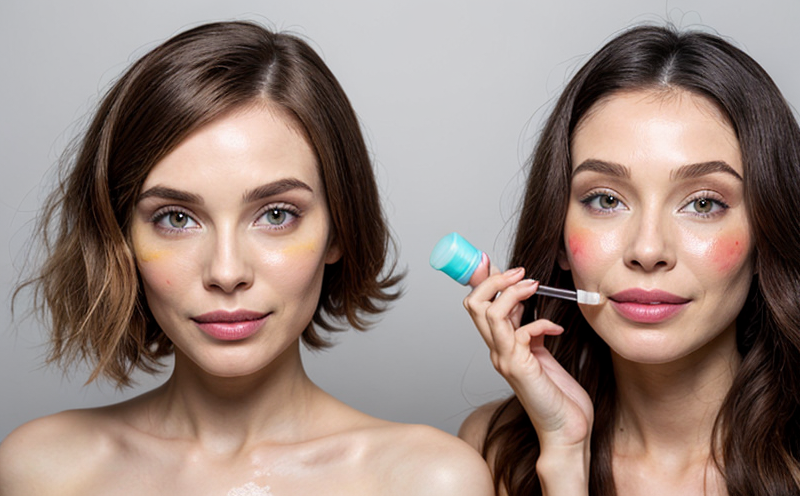Dermatological Safety Testing in Organic Cosmetics
The dermatological safety testing of organic cosmetics is a critical process that ensures the products are safe and do not cause any adverse reactions when used as intended. This service involves evaluating how the ingredients interact with human skin, ensuring they meet stringent standards set by regulatory bodies such as the European Union's Regulation (EC) No 1223/2009 on cosmetic products.
Organic cosmetics are defined by their use of natural and organic raw materials. However, just because a product is labeled 'organic' does not guarantee it is safe for all skin types or conditions. Dermatological safety tests help identify potential irritants, allergens, and sensitizers that could cause adverse reactions like dermatitis or eczema. These tests are essential in maintaining the integrity of organic claims while ensuring consumer safety.
The testing process typically involves several stages. Initially, a thorough analysis of the ingredients is conducted to understand their properties and potential risks. This includes examining the pH levels, viscosity, and other physical characteristics that can influence skin compatibility. Next, in vitro methods are employed using cultured human skin cells or reconstructed epidermis models to simulate real-world interactions between the product and the skin.
One of the most common tests is the EN 15068 test, which assesses the potential of a cosmetic product to cause irritation. This test requires the application of the product on human skin or an appropriate model, followed by observation over a set period to detect any signs of inflammation or adverse reactions. Another critical aspect is the ISO 10993 series, which provides comprehensive guidelines for biocompatibility testing.
The results from these tests are then analyzed meticulously to determine if they meet regulatory requirements and internal quality standards. Compliance with regulations like the EU Regulation on organic cosmetics ensures that consumers have confidence in the products they purchase. Transparency in reporting is crucial; detailed documentation of every test conducted helps build trust between manufacturers, regulators, and end-users.
Dermatological safety testing also plays a vital role in product development. By identifying potential issues early in the process, companies can refine their formulations to enhance efficacy while minimizing risks. This proactive approach not only improves product quality but also reduces the likelihood of recalls or legal challenges down the line.
- Compliance with EU Regulations: Ensures adherence to stringent safety standards set by the European Union.
- In Vitro Testing: Utilizes advanced technology for realistic skin simulation, reducing reliance on animal testing.
- Regulatory Compliance: Guarantees that products meet all necessary requirements before entering the market.
- Data Transparency: Provides comprehensive documentation of each test conducted, fostering trust and reliability.
In conclusion, dermatological safety testing in organic cosmetics is not just a formality but a fundamental aspect of ensuring product safety. By adhering to rigorous standards and leveraging cutting-edge technology, laboratories like Eurolab can provide clients with the assurance that their products are safe for consumers.
Eurolab Advantages
At Eurolab, we pride ourselves on offering unparalleled expertise in dermatological safety testing for organic cosmetics. Our team of highly skilled professionals ensures that every test conducted is not only accurate but also meets the highest ethical standards. Here are some key advantages:
- State-of-the-Art Facilities: Equipped with advanced instrumentation and software solutions, our laboratory provides precise and reliable results.
- Comprehensive Testing Capabilities: We offer a wide range of tests tailored to meet specific needs, ensuring comprehensive coverage.
- Dedicated Consultants: Our consultants are available throughout the testing process, providing guidance and support as needed.
- Confidentiality: Client data is kept strictly confidential, ensuring that sensitive information remains secure.
In addition to these benefits, Eurolab maintains a strong commitment to innovation. We continuously invest in new technologies and methodologies to stay at the forefront of cosmetic testing. This dedication allows us to offer services that go beyond basic compliance, focusing on long-term product improvement and market competitiveness.
Why Choose This Test
Dermatological safety testing is essential for several reasons, particularly in the realm of organic cosmetics where natural ingredients can sometimes pose unexpected risks. Here’s why choosing this test is crucial:
- Consumer Trust: Ensures that products are safe and reliable, enhancing consumer confidence.
- Market Compliance: Helps manufacturers comply with international regulations, avoiding potential legal issues.
- Innovation: Identifies new formulations and ingredients, driving innovation within the industry.
- Competitive Edge: Differentiates products in crowded markets by showcasing superior safety standards.
The test also aids in preventing costly recalls and negative publicity. By identifying potential issues early on, companies can address them proactively, saving time and resources in the long run. Furthermore, it supports sustainable practices through responsible ingredient selection and formulation development.
For quality managers and compliance officers, this service offers peace of mind knowing that all products are rigorously tested before release. R&D engineers benefit from insights into ingredient interactions, while procurement professionals can ensure suppliers meet stringent criteria.
Competitive Advantage and Market Impact
Dermatological safety testing in organic cosmetics is more than just a compliance measure; it provides significant competitive advantages:
- Enhanced Reputation: Demonstrates a commitment to consumer health and well-being, enhancing brand reputation.
- Premium Pricing: Customers are willing to pay more for products that meet high safety standards.
- Better Customer Satisfaction: Safer products lead to higher customer satisfaction and loyalty.
- Innovation Leadership: Pioneers in safety testing can influence industry practices, setting new benchmarks.
Marketers find that highlighting these tests in promotional materials can significantly boost sales. Investors are also more likely to favor companies with robust safety records, leading to better fundraising opportunities and greater market valuation.
In the global cosmetic industry, where trends change rapidly, maintaining a strong focus on safety is crucial for long-term success. Companies that excel in this area tend to outperform their competitors, attracting both domestic and international customers who value ethical sourcing and production processes.





